The hiring process is changing rapidly as our world shifts to remote work. While the focus on online hiring has accelerated in recent months, the ability to manage the entire hiring process virtually is not a new concept.
Online interviews are just one facet of the hiring process that has helped companies hire better teams.
A recent survey by OfficeTeam revealed that 63% of HR managers use or have used video interviewing in the hiring process. Video interviewing is just one example of how recruiters are reaching lots of candidates remotely. From pre-screening interviews to pre-qualification tests, the online interview process can save recruiters time and money. This guide will show you how to utilize the best online interview tools, tips for hosting an online interview successfully, and how to do so at scale.
What is an online interview?
An online interview is an interview conducted remotely through an online chat, video, or audio platform. Sometimes called a digital interview. the online interview is mainly defined by the type of technology or platform used to conduct the interview.
Video dominates the online interviewing space, but the key to making these platforms work for you is learning how to use these tools strategically.
Live video
The most common type of online interview is a video call. The interview will take place over a platform like Skype, Zoom, or Google Hangouts. This is not dissimilar to a face-to-face interview but has the advantage of allowing a company to include remote candidates who can’t make it to the office for an in-person meeting.
Pre-recorded video
Candidates get a few minutes to read over interview questions, and then record their answers for the recruiter to view at their convenience. Also known as a one-way video interview, this format typically includes a time frame and can be curated to add a certain number of re-do recordings depending on the company’s requirements. The questions often serve as an initial screening for employers and can easily be combined with a skills assessment.
Video resume
Video resumes are another example of screening methodology employers can utilize in place of a traditional interview. A recruiter creates a set of guidelines on what the video should include and requests candidates to submit an introduction – similar to an elevator pitch. While you may receive a few well-rehearsed answers, it will give you a sense of communication skills as well as confidence and body language.
Skills assessment
an online coding interview or simulation of job-related skills can help recruiters get a clearer picture of a candidate’s talent than a traditional job interview. As we’ve covered, traditional interviews are not a predictor of performance. Rather, the best way to find the right new hire is to test job-related skills in context using an online interview platform.
Live chat
Chat-based recruitment is on the rise as more Millennials and Generation Z employees enter the talent market. Recruiters are turning to tools like WeChat, Whatsapp, and Facebook Messenger to streamline pre-screening and early-stage interviews in the hiring process.
Chatbot
AI recruitment tools like Alorica can take over the initial candidate screening step and have options for candidates to upload video and voice responses.
Advantages of interviewing online
Online interviewing saves companies time and money. The lower costs of interviewing hundreds of candidates makes online interviewing the best option for most businesses.
Interview at scale

Video or recorded interviews allow you to screen a higher volume of candidates efficiently. Define a set of questions once on a platform that can automatically ask and receive answers for you. Send a link to dozens, if not hundreds, of candidates to reach an extensive network of potential candidates. Almost instantly, you’ll be able to see a list of ranked candidates with the right experience, soft and hard skills.
A typical in-person interview can take 45 minutes to an hour, while a digital, recorded interview evaluated by an AI recruitment tool can rank dozens of candidates in the same amount of time.
Shorten the hiring process
Online interviews ease the scheduling burden. When you’re trying to bring 20 candidates in for a face-to-face interview, you can end up going back and forth for ages trying to schedule a time that works for everyone. It’s a juggling act that often extends the process unnecessarily – and one of the reasons why the average time-to-hire is 36 days. Recorded video interviews make the hiring process better for the candidate and the recruiter. Candidates can answer questions when it’s convenient for them, and hiring managers can review their responses when it suits their schedule. Real-time video calls will still save you time by eliminating the travel time you would need to account for on either end.
Screen in, not out
Much weight is often given to the traditional interview; but, in reality, interviews should only comprise a small part of the candidate selection process. Online interviewing tools can help balance this step in the hiring process by screening in candidates – not eliminating them based on arbitrary lines on a resume. Instead of screening people out based on background, online interview tools like Vervoe can rank top-performing candidates after their skills have been validated.
Likewise, online interviews can improve performance tracking moving forward. After utilizing video interviews in your hiring process, you’ll be able to look at your top-performing employees and evaluate what their interviews had in common. Analyzing their body language, answers to specific questions, and skill set may help you choose more reliable candidates going forward.
Increase consistency
During a face-to-face interview, it’s easy to get side-tracked. While you may try to be consistent with your questions, it’s easy to forget to cover a particular point or run out of time. It also means each candidate gets a slightly different interview experience and ultimately, it makes it harder for you to compare prospects. Automated interviews allow you to interview all candidates in parallel and eliminate this issue. You can keep consistency across the board with a set of predetermined questions. It evens the playing field for the applicants as well as the hiring managers, increasing the odds of a better-informed decision.
Improve diversity in hiring
Online interviews are like virtual job auditions. These job simulations can be done at scale for hundreds of applicants simultaneously and under the same conditions. This means every applicant has an equal chance to show their talent, regardless of what their resume says. It also broadens your applicant pool, allowing remote candidates who may not have the resources to make it to your office in-person to participate in the hiring process.
Gauge technological experience
Regardless of the position, you’re hiring for, an online interview will give you an understanding of the candidate’s command over technology. No matter the role, you inevitably want to hire someone who has some degree of knowledge about technology.
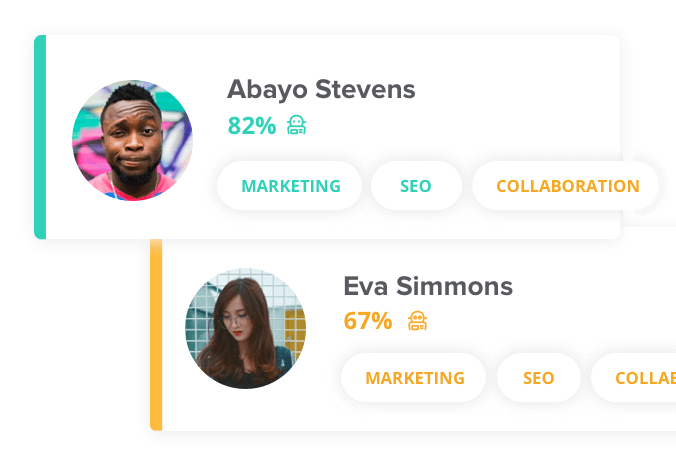
This process allows you to judge their familiarity and understanding right off the bat. The way they conduct themselves during an online interview can also reveal a lot about their attention to detail and preparedness.
Common mistakes in online interviews
For many organizations, adopting the hiring process to an online interview platform quickly means they simply translate existing processes to virtual methods. Hiring teams need to proceed with caution in doing this.
The traditional hiring process is fraught with bias. It’s not an adequate solution to avoid bias by replacing traditional face-to-face interviews with a video call. Relying on a resume screen, phone screen, and then an online video call still opens the door for the same inherent biases; it just means the process is done remotely or virtually.
“Without Vervoe we would need nine times the number of staff to do the same job.”
David Castro – Talent Acquisition Manager, Walmart
And, while receiving video recordings from candidates may save time in scheduling, the fact is that those recordings still need to be reviewed by someone in your organization. Watching back hours of candidate videos is simply not a scalable solution.
How to conduct an online interview
An online interview has some of the same etiquettes as an in-person interview, but with the added advantages of technology. Here are some steps to take and things to factor in when designing your online interview process.
Determine where in the hiring process to use an online interview
For most recruiters, the most challenging part of using an online interview platform is determining how and when to slot this tool into the hiring process. Online interviews can replace the phone and resume screen, be used before the in-person interview, or replace the final in-person interview. Any or all of these steps can be conducted remotely using the right online interviewing software.
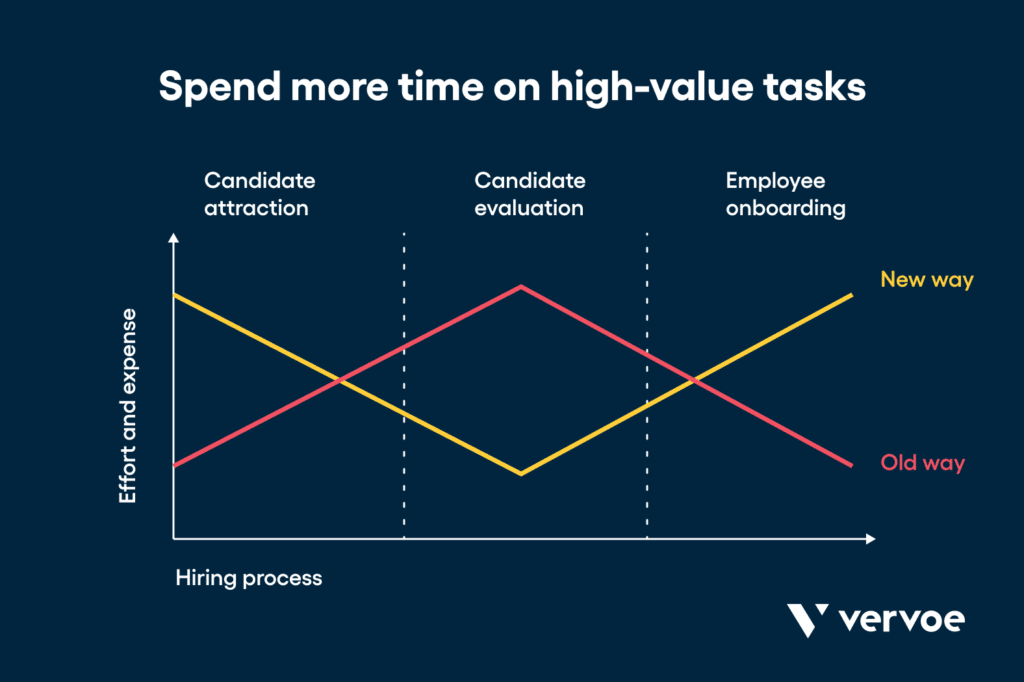
Deciding to conduct digital interviews is an opportunity to re-think your hiring process. Traditionally, an interview is held at the very end of the hiring process. But moving an online assessment to the beginning of your process means you can quickly identify applicants with the right skill set to progress to the next stage.
Find the right tool
A challenge to remote interviewing is making sure the technology is easy-to-understanding and widely accessible to remote candidates. Find a tool that doesn’t involve extra equipment (like a webcam or microphone) or a complicated download process. The best online interview tools work over Wifi and can be used on a mobile or desktop device. We’ll take you through some of the best online interview tools later in this guide.
Just because you’re using an online tool doesn’t mean your candidate experience needs to suffer. Ensure the platform or tool you use for digital interviews is customizable to your brand. With a flexible tool, you can create an online experience that’s reflective of your employee experience and help avoid damaging your employer brand.
Design your questions
Ultimately, this is the most critical step in your online interview. You may have all the other factors in place, but if you haven’t prepared your questions accurately, the interview won’t be useful for either party. Whether it’s a pre-screening interview or a first round, your questions should reveal relevant information about the candidate.
You’ll have a better chance of your key decision-makers buying into your choice of platform if you consult these stakeholders as you develop questions. Think in terms of business outcomes – you need to select the best person to fit into the team and deliver on the job. Consult people within your organization: what do they need in a new hire? How would they assess this person? What skills are meaningful to the role?

Refer to the job description to craft questions that are relevant to the open role. In addition to skill testing, ask about a candidate’s past work experiences, challenges, and strengths as well as their goals for professional development. To gauge an understanding of their personality, be sure to include questions about their preferred management style, their ideal work environment, and their highs and lows from previous experiences.
Be mindful of the timing
If you’re casting the net to international applicants, you need to be mindful of time zones. You must mark the time zone when scheduling the interview, so all parties are on the same page from the get-go. Give candidates partaking in a one-way or pre-recorded interview plenty of time to go through the questions and answer thoughtfully. If you choose an always-on chatbot, make sure there’s a procedure in place to respond to questions and confirm receipt of applications that come in while your team is offline.
Keep it professional
It’s important to treat an online interview with the same level of respect as an in-person interview. It’s easy to assume that it’s more casual because the candidate isn’t physically in the office but, if anything, an online interview should be more intense. Treat it with the same level of professionalism as you would an in-person interview.
Candidate experience and online interviews
Many companies worry that the online interview feels too impersonal and can ruin the candidate experience. The candidate experience is an essential factor to consider throughout the hiring process. It can impact your employee retention and your employer branding; a candidate’s first impressions are formed early on and will affect their decision-making down the line.
When managed properly, candidates report that online interviews are actually more enjoyable than in-person interviews. Digital interview tools help move the hiring process along more quickly, and job auditions can keep candidates engaged from early in the hiring process.
Reduce stress
Face-to-face interviews can be hugely nerve-wracking for many applicants. Stressed interviewees can inadvertently send the wrong signal of their capabilities. In some instances, they may fail to deliver a response that’s as eloquent as it could be, hindering their ability to land the right job. Brief recorded video interviews and assessments based on real job situations can alleviate this challenge, giving interviewees an opportunity to re-do specific questions. It allows them to frame themselves in the best light possible during the screening process.
Beyond the natural in-person interview stressors, online interviews eliminate the added auxiliary stress of the experience. Multiple factors inevitably add to the pressure of a face-to-face encounter. Will there be a traffic jam? Can you find the correct reception desk? Where will you park? These are all auxiliary factors that cause unnecessary anxiety. They’re all quickly eliminated by an online interview process.
Increase opportunity
One-way video interviewing also creates opportunities for passive job seekers to discover a new role. Many talented individuals aren’t seeking a different job but could be interested in new opportunities. Traditionally, driving across town to interview during work hours would be difficult, but thanks to pre-recorded interviews and online job auditions, it’s a lot easier for candidates to attend interviews. Online interviews ensure that passive job seekers have broader access to opportunities and career advancement. Video interviewing makes it easier to conduct meetings after-hours, alleviating the stress of pursuing a career change under the watchful eye of your current employer.
Another bonus of online interviews for applicants is the increased, global availability. Candidates can attend interviews and apply for jobs around the world, removing the stigma or limitations of geography. With today’s technological advancements, more and more companies are offering remote working solutions, and this opens the door for talented employees worldwide.
Be consistent
Consistency within the candidate experience helps ensure that your brand is represented the same way across different touchpoints, which impacts your marketing efforts and customer loyalty. An AI-powered online interview solution that is designed to hire at scale can communicate with those who complete your skill assessment letting them know the next steps.
There are a number of HR tech tools and platforms that help teams communicate consistently with candidates throughout the hiring process. Make sure whatever tool you choose is customized to include the same logo, branding, and company description as-is on your LinkedIn page, social media channels, and careers page. And, ensure you can customize the experience to reflect the voice of your organization.
How to choose an online interview tool
When it comes to selecting an online interview tool, it helps to evaluate your objectives as a company. Your online interview tools should aim to include skills assessments, pre-screening interviews and/or video calls.
Before choosing your online interview approach, it’s worth considering the following factors.
What are your goals?
Before you start to compare features, you need to know how you’ll measure success. As mentioned above, consultation with all stakeholders in the business will help you determine goals that are meaningful to your organization; from finance to hiring managers.
Going digital with your interviews is an opportunity to review your full hiring process. Does your team want to improve candidate quality? Do you need to reduce recruiting costs? Is time-to-hire your most important metric? Being able to articulate a goal will not only help you measure success but make it easier to talk to software providers to make sure they can deliver according to your needs.
What skills does a successful applicant need to possess?
This question can help you narrow down what type of tool will best fit your needs. For instance, a sales role will require a tool that tests someone’s communication skills; an engineer or IT position is better suited to an online coding interview.
What features should your software have?
Once you know what your recruiting team will use the online interview to measure, the next question is how: what features does your platform need to have to deliver results? Consider some of these questions:
- Can you use the platform for any role? Or is it limited to just one section of the business?
- Will you be able to design the experience according to your brand, including logos, images, brand videos, and custom emails?
- Will the tool save you time by grading candidates for you, so you can focus on people with the right skills?
- Can your candidates edit and answer questions in multiple formats to reflect the role?
- Can you configure instructions and write your own questions, or are you limited to pre-loaded templates?
- Does the tool integrate with your other recruiting software?
What are the costs?
Some tools – like Google Hangouts or Zoom – are free, but they provide almost no ancillary features that make the overall online interview process more efficient. While some online interviewing tools come with a fee, the ease and better candidate experience they provide make it worth the cost.
Return to your goals; how much is your current process costing you, and will you see a return on your investment with this tool?
Pricing for interview software can vary depending on your company’s needs. Like any piece of recruiting software, there are various components or features that will affect pricing. When you’re searching for the right tools, make sure you pay attention to the unique pricing model and how that will change over time.
For example, if you find software where you pay by seat but you have a host of hiring managers who’ll require one, your price will drastically increase. Or, if you pay by interview but you know you want to run hundreds of calls, perhaps another tool is better suited.
Most of the value of digital interviewing comes from saving time, so focus on the tools that will benefit you and your company’s needs the most. At times, perhaps the higher price is worth it to increase your turnover and ROI drastically.
Tools for online interviews
- Vervoe
- VidCruiter
- SparkHire
- interviewstream
- Outmatch
- AllyO
- Mya
- CodeSignal
- CoderPad
There are plenty of tools out there to aid you in conducting an effective online interview. Each of these platforms offers a set of features designed to support you in the hiring process. It’s about finding the perfect fit for your requirements.
1. Vervoe
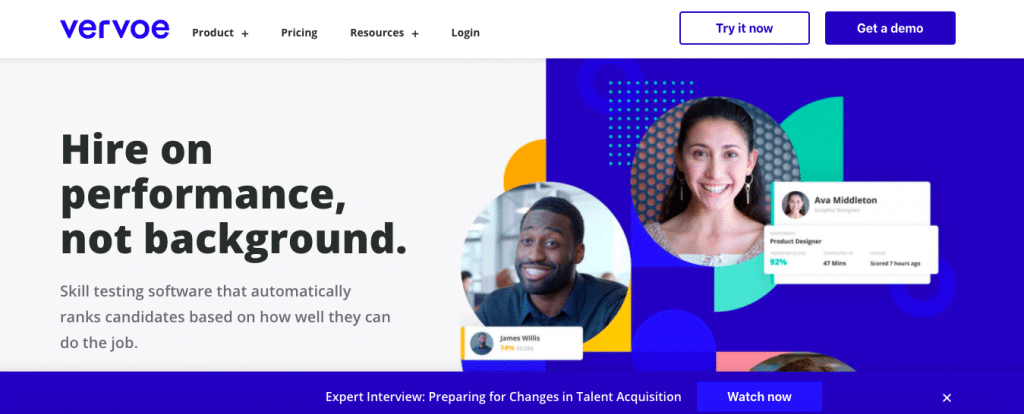
Vervoe transforms the way you’re able to screen candidates. The platform automatically grades and ranks all your candidates based on a range of assessments you can curate. There is a selection of customisable content, including an automated skills test builder and a library of expert content by industry experts. There are multiple testing and grading formats available so you can create assessments that are reflective of the role you’re hiring for. AI-powered hiring automation allows you to hire at scale, efficiently managing increased volumes of applicants. API integration capabilities makes it easy to use Vervoe in conjunction with your other HR platforms.
2. VidCruiter
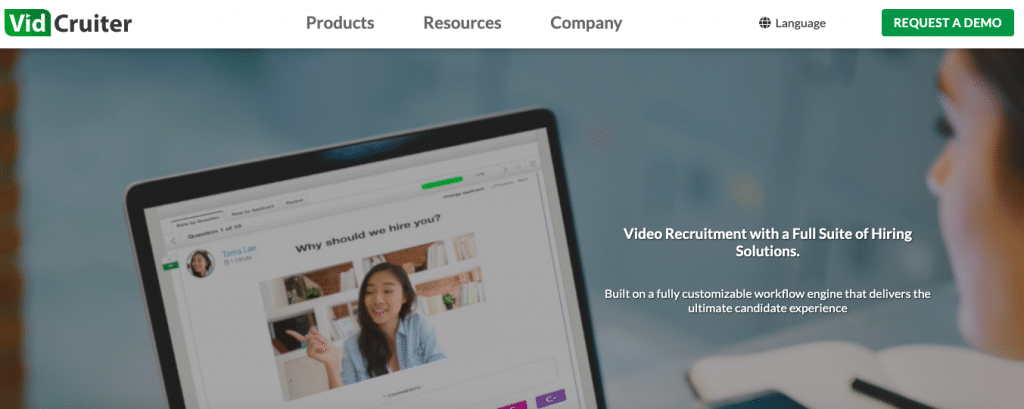
Designed to help streamline your hiring process, VidCruiter was one of the first video interview platforms. It offers an array of features, including one-way video interviewing and live video interviews. You can conduct one-on-one conversations or panel interviews on the platform, recording the conversation so you can refer back to it. The platform can be used on any device, making it accessible for all candidates.
3. Spark Hire
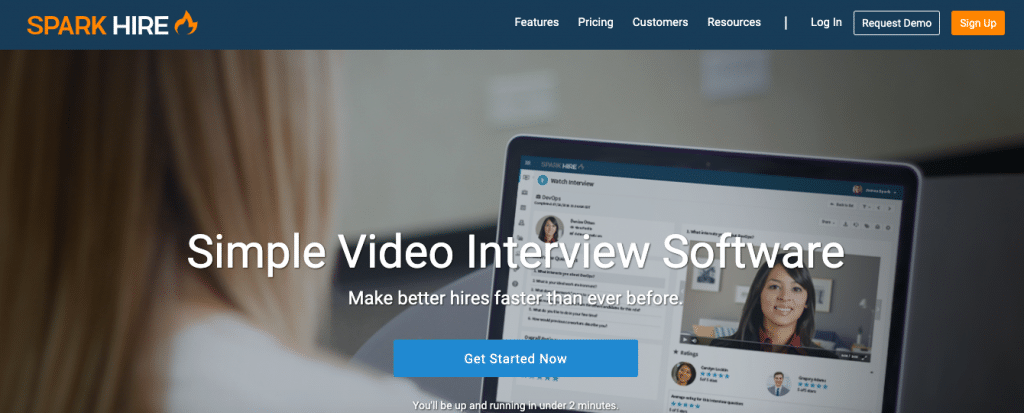
Spark Hire is rated as one of the top platforms for online interviewing. The platform delivers a comprehensive suite of features. There are one-way video interviews, live video interviews, customisable branding, interview evaluation dashboards and interview collaborations, to name a few features. Thanks to their up-to-date integrations, the software can be used in conjunction with any other HR and recruitment platforms.
4. interviewstream
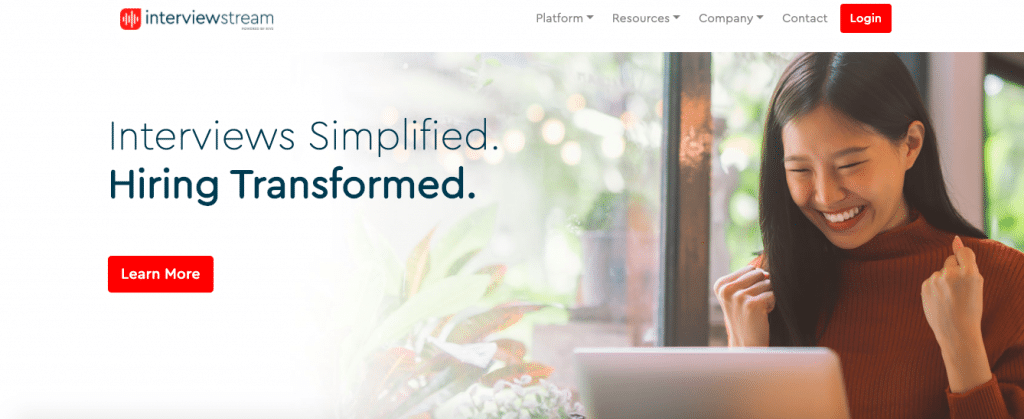
interviewstream is a one-stop-shop for many recruiters boasting all things interview related. The platform includes features like an interview builder, interview on demand, interview scheduler and interview connect where you can record and host meetings. It’s a basic platform that delivers tools to conduct your video calls, perhaps best suited to companies with tighter budgets.
5. OutMatch
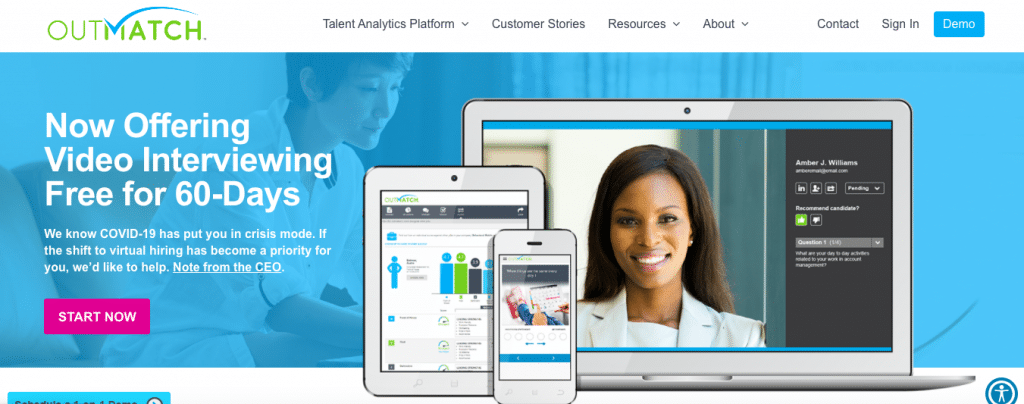
OutMatch includes various video features to complete the ultimate video interview. From a video introduction to a pre-recorded video interview, live interviews, and video scheduling, it offers access to technology designed to simplify the process. You also gain access to a library of pre-vetted interview questions along with a drag-and-drop interview builder.
6. AllyO
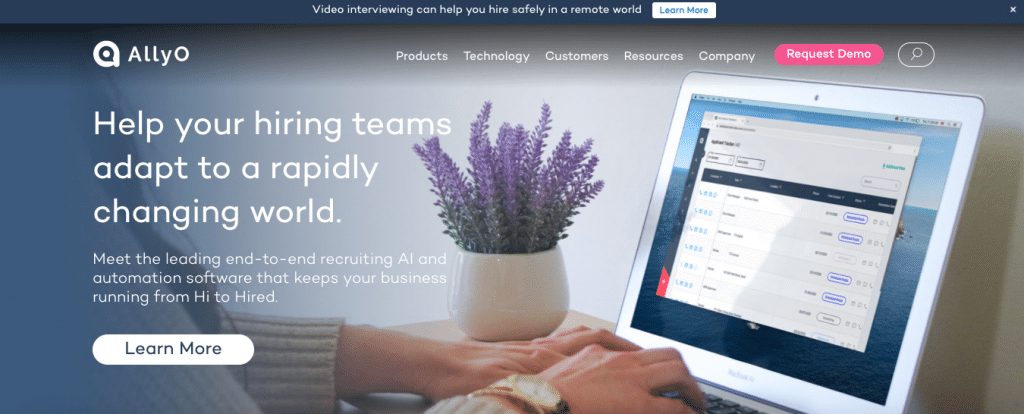
AllyO’s AI recruiting software includes a scheduling bot as well as an interview module. The platform is excellent for high volume recruiting, introducing automation at every corner. From capturing applications through mobile and text recruiting, to screening and assessments and then scheduling and hiring, the entire flow is automated. The platform includes CRM integrations, analytics and reporting.
7. Mya
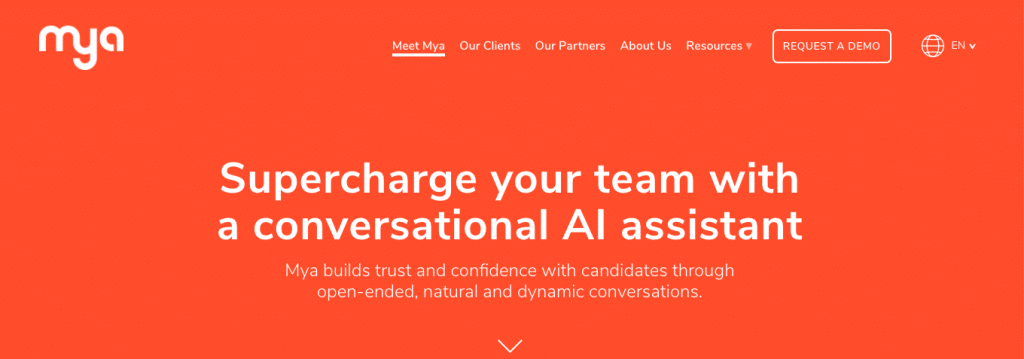
Mya is a chatbot tool that can take on much of the time-consuming back-and-forth with candidates. Mya handles basic admin for recruiters over text message, asking basic questions like a candidate’s start date and salary requirements. In turn, candidates can also ask Mya questions. If she doesn’t know the answer, she’ll ping the recruiter directly.
8. CodeSignal
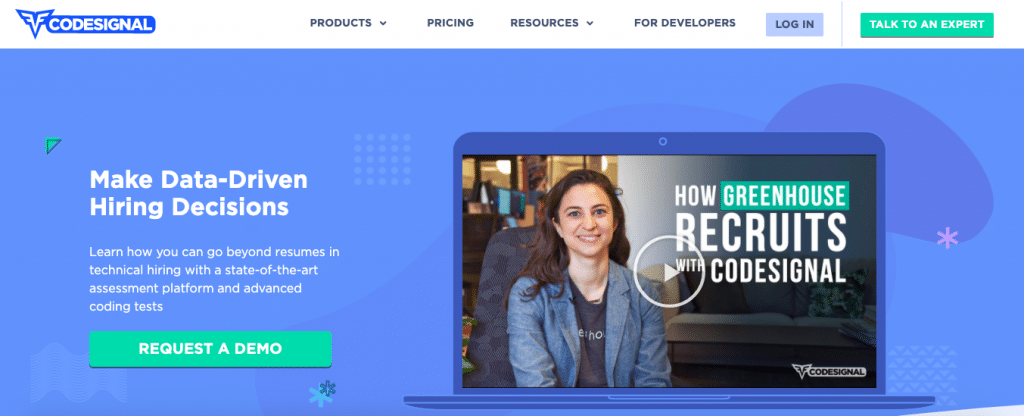
CodeSignal is an online interview platform built for hiring developers, programmers, and other technical roles. The tool manages interviewing and skill testing, as well as certified coding assessments so you can be sure the candidate you hire is the right fit. CodeSignal’s UX replicates the popular coding environment Visual Studio Code. Hiring teams can test 70+ languages and select tasks from existing CodeSignal frameworks and libraries.
9. CoderPad
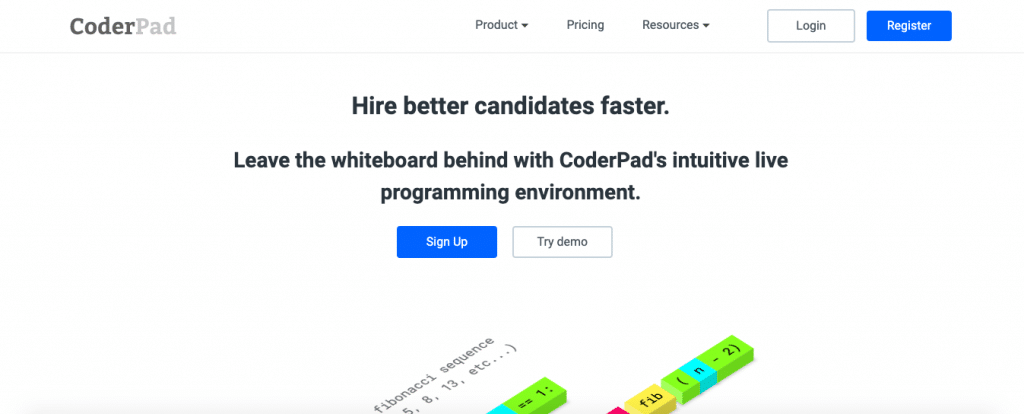
CoderPad is another option for companies seeking coding talent. This interview tool is designed to let candidates write programs and test them live. Interview collaboratively with your candidate when you set up a custom environment. For instance, a hiring manager can log in and work alongside a candidate who is writing code to see more accurate picture of their abilities. The platform can run code in 30+ popular programming languages.
Final thoughts
No matter what tool you choose, make sure it has 24/7 support to make implementation and training easy for your organization. Any piece of software you add should make your recruiters’ jobs easier, not more complicated.
For more resources to improve your hiring process, check out Vervoe’s library of free recruitment guides.




















